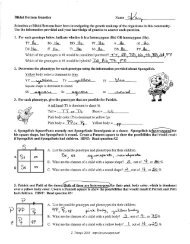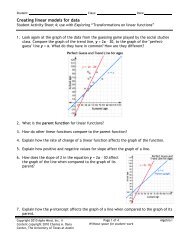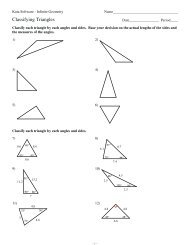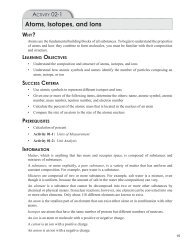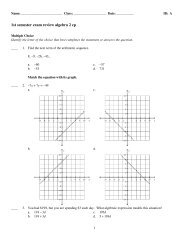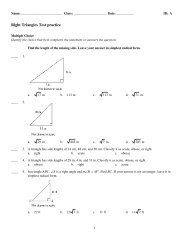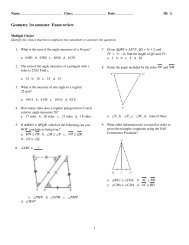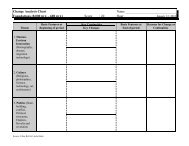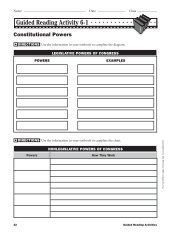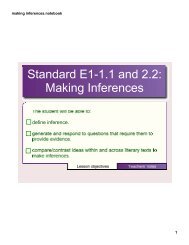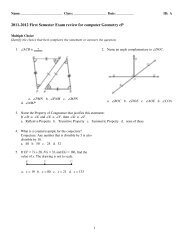Standard 2.1- Westward Expansion
Standard 2.1- Westward Expansion
Standard 2.1- Westward Expansion
You also want an ePaper? Increase the reach of your titles
YUMPU automatically turns print PDFs into web optimized ePapers that Google loves.
USHC – <strong>2.1</strong>: Summarize the impact of the westward movement on<br />
nationalism and democracy, including expansion, displacement of<br />
Native Americans, conflicts over states’ rights and federal power<br />
during the era of Jacksonian democracy as the result of major land<br />
acquisitions.<br />
Opening:<br />
Unit 3 Pretest<br />
Go over Unit 2 Test<br />
Work Period:<br />
PPT/Notes<br />
Activity 1<br />
PPT/Notes<br />
Activity 2<br />
Closing:<br />
QUIZ
Notes<br />
Recommended: Cornell Style notes<br />
<strong>Standard</strong> <strong>2.1</strong><br />
<strong>Westward</strong> <strong>Expansion</strong><br />
KEY TERM/<br />
PHRASE<br />
What does it mean?<br />
Why is it important?<br />
KEY TERM/<br />
PHRASE<br />
What does it mean?<br />
Why is it important?<br />
KEY TERM/<br />
PHRASE<br />
What does it mean?<br />
Why is it important?
RECAP: THE JEFFERSONIAN ERA<br />
3 rd President of the U.S.<br />
1800-1808<br />
Election of 1800 pitted<br />
Thomas Jefferson and his<br />
Democratic-Republican Party<br />
vs. John Adams and his<br />
Federalist Party<br />
While Jefferson defeated<br />
Adams by 8 electoral votes, he<br />
tied his running mate, Aaron<br />
Burr<br />
For six days the House of Reps<br />
took vote after vote until 36<br />
votes later – Jefferson<br />
prevailed (Led to 12 th<br />
Amendment)
1800 Election Results
SIMPLIFYING THE GOVERNMENT<br />
• Jefferson’s theory of government,<br />
known as Jeffersonian<br />
Republicanism, held that simple,<br />
limited government was the best<br />
for the people<br />
• Jefferson decentralized the<br />
government, cut costs, reduce<br />
bureaucracy, and eliminated some<br />
taxes<br />
• He also pursued the purchase of<br />
the Louisiana territory.<br />
Jefferson Memorial
<strong>Westward</strong> <strong>Expansion</strong> Nationalism<br />
and Sectionalism<br />
While states could agree on<br />
expansion, they disagreed<br />
on policies of the federal<br />
government such as:<br />
1. Price of land<br />
2. internal improvements<br />
3. Support of tariff policies<br />
4. <strong>Expansion</strong> of slavery
Changing American Character<br />
(Individual) State Pride National Pride Nationalism
Support<br />
Unity<br />
Love<br />
for<br />
Country<br />
Nationalism<br />
Pride<br />
Desire<br />
For<br />
country<br />
success<br />
Country<br />
Before<br />
other
Nationalism<br />
<strong>Westward</strong> expansion promoted the ideal of the hardy<br />
pioneer as the true American and the common man as the<br />
embodiment of democracy (INDIVIDUALISM)<br />
Fueled the idea of MANIFEST DESTINY or “God’s will to<br />
expand from sea to sea.
THE LOUISIANA PURCHASE<br />
By 1803, French leader<br />
Napoleon had abandoned his<br />
dreams of an American<br />
Empire<br />
He needed money to fight<br />
European wars, so he<br />
accepted Jefferson’s offered<br />
of $15,000,000<br />
More than doubled the size<br />
of our country<br />
Lewis and Clark ordered to go<br />
explore new territory
THE LOUISIANA PURCHASE<br />
Secured control of the<br />
Mississippi River as a highway<br />
for American agricultural<br />
products (used New Orleans<br />
to send to world markets)<br />
Provided government owned<br />
land available for purchase<br />
(Land Ordinance). New lands<br />
spread democracy & became<br />
states (Northwest<br />
Ordinance).
Democracy from the LA Purchase<br />
Right to vote more<br />
widespread b/c more MEN<br />
can own land.<br />
In the 1820s and 1830s,<br />
states dropped the<br />
property qualification &<br />
gave voting rights to all<br />
white males & free African<br />
American property owners.
Controversial LA Purchase?<br />
Jefferson’s loose<br />
interpretation of the<br />
elastic clause set the<br />
precedent for future<br />
land acquisitions<br />
(purchases)<br />
Jefferson is a Democratic<br />
Republican….what’s the<br />
big deal?
In the meantime..<br />
James Madison became<br />
President and America entered<br />
the War of 1812 with Britain<br />
over impressment (ended in<br />
1814.)<br />
4 th President 1808-1816<br />
5 th President<br />
1817-1825<br />
6 th Presdient-<br />
JQ Adams<br />
1825-1829<br />
Next, James Monroe became<br />
President in 1816 and signed a<br />
treaty with Britain to occupy<br />
the Oregon Territory. A<br />
different treaty secured<br />
Florida.
Next up? Andrew Jackson<br />
First President elected from<br />
the West<br />
Democrat and “champion of<br />
the common man.”<br />
Announced a formal policy of<br />
removal of natives to make<br />
room for the common white<br />
man
Native American Relations<br />
Natives practiced two policies:<br />
1. Assimilation<br />
Become a part of American<br />
culture/society<br />
Cherokees in GA-eventually lost<br />
their legal fight to keep their<br />
land<br />
2. Resistance (Revolt)<br />
Fight back against persecution<br />
Seminoles in Florida were<br />
defeated
Impact on Native Americans<br />
President Andrew Jackson’s<br />
Policies:<br />
Indian Removal Act<br />
Provided Federal money to<br />
move all Indians to the<br />
Great Plains<br />
Trail of Tears<br />
Moving GA, SC, and NC<br />
Cherokee Indians to<br />
Oklahoma Territory
Impact on African Americans<br />
Slave owners took<br />
only part of their<br />
human property on<br />
the trek west.<br />
They would leave the<br />
rest of the slave<br />
family behind.
Create a circle<br />
map describing<br />
<strong>Westward</strong><br />
<strong>Expansion</strong><br />
Activity 1
<strong>Westward</strong> <strong>Expansion</strong> Leads to<br />
Regional Tensions<br />
South wants to extend<br />
slavery into new<br />
territories while the<br />
North does not.<br />
Led to a conflict between<br />
states’ rights and federal<br />
power…
The Nullification Crisis of the 1830s<br />
Northern manufacturers<br />
wanted high protective<br />
tariff<br />
Southerners produced<br />
cash crops and consumed<br />
manufactured goods and<br />
saw a high tariff as an<br />
“abomination.”<br />
The West sided with the<br />
North for support in<br />
internal improvement and<br />
cheaper land prices.
The Nullification Crisis of the 1830s<br />
In the 1830s, SC used the states’<br />
rights argument to declare the<br />
tariff “null and void”<br />
Jackson supported the federal<br />
government and asked Congress to<br />
approve using force to get SC back<br />
in line, but a compromise was<br />
reached to lower the tariff.<br />
The Union had been saved…for<br />
now!
Next up…Oregon<br />
The US claim to Oregon<br />
came from Lewis and<br />
Clark.<br />
Americans moved to the<br />
Oregon Territory to trade<br />
furs and to farm.<br />
The problem? The British<br />
also claimed the land.<br />
We shared joint rights<br />
with Britain until the<br />
1840s when a treaty<br />
turned it over to the US
Texas<br />
Annexation of the<br />
Republic of Texas<br />
occurred 9 years after<br />
Texas became<br />
independent from<br />
Mexico.<br />
The rest of the<br />
southwestern US was<br />
acquired by the end of<br />
the Mexican War (we will<br />
study this in more detail<br />
next class!
Impact of <strong>Westward</strong> <strong>Expansion</strong>?<br />
South sought to protect<br />
their “peculiar<br />
institution” by pushing<br />
for slavery.<br />
THIS WOULD<br />
ULTIMATELY LEAD TO<br />
THE CIVIL WAR.
Major Land Acquisitions<br />
From Whom and How?<br />
Land From Whom? When? How?<br />
Louisiana Territory France 1803 Pres. Jefferson<br />
purchased for $15<br />
mil.<br />
Florida Spain 1810-1819 Given by Spain<br />
Texas Mexico 1845 Mexican-American<br />
War<br />
Oregon Great Britain 1846 Treaty with Britain<br />
Mexican Cession Mexico 1848 Treaty of<br />
Guadalupe-Hidalgo
Activity 2<br />
Label and color the territorial additions to the US<br />
during the time period of western expansion.<br />
Make sure to include the year each territory was<br />
added!
CLOSING<br />
It’s QUIZ TIME!



